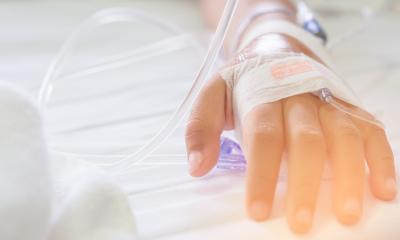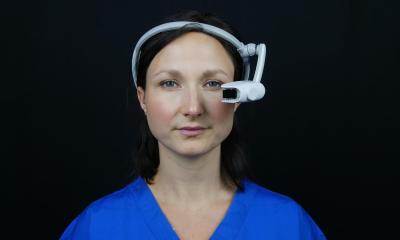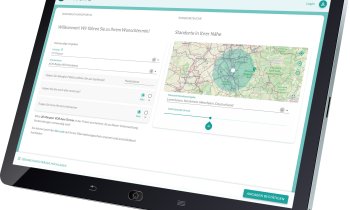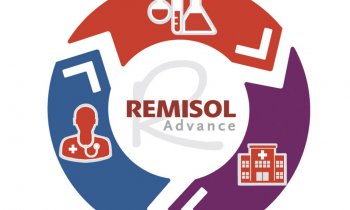
Image source: Shutterstock/BlurryMe
Article • New concept 'HeiMeKOM'
Involvement of patients and relatives improves cancer communication
The Heidelberg Thorax Clinic is trialling a newly structured, longitudinal communication concept to meet proactively the complex needs of stage IV lung cancer patients and their relatives.
Report: Cornelia Wels-Maug
The concept is aimed at enhancing prognostic understanding and building the basis for proactive care planning, early integration of palliative care and shared decision-making, ultimately to improve improving overall care. First experiences look promising. Patients, and those treating them, talk about better patient-doctor relationships and also about the positive impact on the wellbeing of sufferers, along with a reduced psychological impact on staff.
According to one study, more than 60% of medical errors occur due to lack of communication between doctors and patients. The German Federal Ministry of Health (BMG) acknowledged the importance of communication for treatment success when it listed ‘strengthening patient-centred care/information for patients’ in its 2008 National Cancer Plan as one of the four fields of action to contribute towards improved care of cancer patients.
At the Heidelberg Symposium ‘HeiMeKOM Heidelberg Milestone Communication’ held in the Thorax Clinic at the end of January, Dr Antonius Helou of the BMG explained that to enhance patient focus, the ministry is examining the relationship between doctors, nurses and patients. Given the importance the BMG places on communication, it also promotes the HeiMeKOM initiative. The symposium featured insights and experiences gathered in the context of this project so far. The initiative is run by the Thorax Clinic at Heidelberg University Hospital, the Department for General Medicine & Health Services Research and by the Institute for Medical and Pharmaceutical Proficiency Assessment (IMPP).
A ground-breaking concept
The choice of the title ‘Milestone Communication’ refers to a novel format of interactions with lung cancer patients who have a terminal prognosis (median survival < 12 months). It builds on the four central discussions, or milestones:
- the initial discussion
- discussion of the treatment concept
- discussion of perspectives
- discussion around censensus
With this new concept, a nurse is now always present alongside the doctor during these discussions, with the treatment team having received special communication training. Nurses also call patients a week after each milestone discussion and then monthly, to assess their understanding and progress of the illness and their needs for palliative care, making the care process as seamless as possible. HeiMeKOM also aims to enhance interprofessional cooperation and assist all those involved in the treatment process in supporting one another during these challenging discussions.
For the first time: recording patients’ preferences
Keeping records that also integrate relatives is done to ensure patients are better listened to and that sensitive topics (the importance of therapeutic measures with limited effect, proactive care planning and palliative care) are integrated into the care plan in time and in a more structured manner and then successfully implemented.
The exchange with the patient during more stable phases of their illness is particularly important, especially as the target group consists of people with limited life expectancy. Great importance is attached to their wellbeing and to maintain, or respectively improve, the quality of their lives. Patients are now also asked about their preferences, with those being documented. What has emerged is patients’ wish for continuity, for regular appointments, for reassurance that the treatment concept is the right one and for opportunities to talk about their end of life care.
The HeiMeKOM concept also has been recognised outside the Thorax Clinic and was awarded the ‘Springer Medicine Innovation Prize 2019 – Inter-professional Projects in Healthcare’, at the 7th Interprofessional Healthcare Congress.
Recommended article

Article • 'Is it safe?'
Effective communication on radiation risks
Communicating radiation risks is not only a legal requirement, it is also a moral obligation, asserts Dr Shane J Foley, radiographer and assistant professor at the UCD School of Medicine in Dublin, Ireland. Passing on radiation information has its pitfalls, but several helpful tools can improve communication, some of which the expert highlighted during ECR 2018.
HeiMeKOM in action
Some advanced stage lung cancer patients at the Thorax Clinic have been cared for using this approach since May 2018. The key objective is to improve care helped by the new approach and to generate evidence for it. A range of qualitative and quantitative tools is available for evaluation, including assessments of patients’ needs for support and quality of life as well as health economic measures of captured via interviews, workshops and questionnaires. The first (133) and second (172) milestone discussions along with follow-up conversations (total: 146) have been evaluated so far. The assessment of the other two milestone discussions, as well as the control group discussions, have not been concluded yet, so the final results of the project are not available.
The treatment team at the Thorax Clinic has received a lot of positive feedback from patients and colleagues, confirming the high rate of acceptance for the project.
Initial findings
The evaluation of the milestone discussions indicates the following positive effects:
- Improved individual quality of life for patients & relatives
- Less distress amongst patients & relatives
- Better orientation in the healthcare system, including improved cross-sector networking
- Enhanced informed decision-making: better adherence to treatment, higher prognostic awareness, more efficient use of healthcare resources (fewer A&E admissions at night and during weekends)
- Strengthening of patient competence
- Enhanced interprofessional cooperation and team processes
- Improved communicative competence within the treatment team.
Compared to the quarterly costs incurred for a cancer patient’s pharmacological care, the cost of medical consultations carries hardly any weight. A staff member at the Thorax Clinic calculated that the quarterly cost of medication is around €20,000 while medical consultations amount to between €80 and €150.
This is a good reason to continue with HeiMeKOM, to extend it to other conditions and to embed the milestone concept in standard care in the medium term, so that more patients can benefit from it. ‘HeiMeKOM should cover the entire medical landscape,’ says Professor Michael Thomas MD, who is the Senior Consultant for Medical Oncology in the Heidelberg Thorax Clinic. Undoubtedly, the professor will not be the only one to wish for this.
23.04.2020









